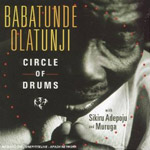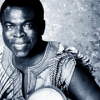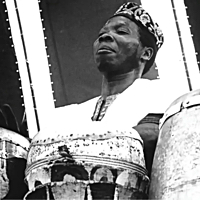Home » Jazz Musicians » Babatunde Olatunji
Babatunde Olatunji
Babatunde Olatunji - African Drums (1927-2003)
Before there was world beat music, before there was Afropop or any of the other genres of African music marketed to Western audiences, there was Babatunde Olatunji. Olatunji's 1959 “Drums of Passion” album may have been the first African music release recorded in a modern U.S. studio. That album and its successor “Zungo!” proved extremely influential in the world of progressive 1960s jazz, helping to introduce saxophonist John Coltrane and other jazz players to African music. Olatunji himself made the United States his home and became a durable and enthusiastic ambassador of West African culture
A member of the Yoruba ethnic group, Olatunji was born in 1927 in the Nigerian village of Ajido, about forty miles from the capital of Lagos. His father was a fisherman. Traditional Yoruba drumming accompanied many of the events of village life, and Olatunji was taken by his great-aunt to hear drum ceremonies. The drummers celebrated every occasion, proclaimed the coming of local politicians, evoked the dreams and aspirations of their people. The drumbeat of his childhood became the life blood of his adult experience as Olatunji grew and traveled throughout the world popularizing the music of his Yoruban heritage.
While still in Africa in the late '40s, the ever resourceful Olatunji read about the Rotary International Foundation scholarships offered to youths from war-affected countries. By 1950, Olatunji and his cousin were each awarded a scholarship and were on their way to America to attend school in Atlanta, Georgia. Olatunji came to the U.S. determined to succeed in the international arena, at the time he had no aspirations to be a musician.
In 1954, after graduating from Atlanta's Moorehouse College with a degree in Diplomacy, Olatunji moved to New York to begin a Political Science postgraduate program in Public Administration at New York University. Throughout his American education he had a unique perspective on the cultural divides between black and white Americans. Early on he realized that music, drumming in particular, had the ability to break down the long-established cultural divisions within the "Melting Pot" that America was thought to be in those days. To cover his expenses he started a small drumming and dance group. Recognizing the influence of African polyrhythms in jazz, some of Olatunji's earliest fans were the jazz greats of the time; men like John Coltrane, Yusef Lateef, Clark Terry, George Duvivier, Count Basie, Duke Ellington, Quincy Jones, and Dance luminary Alvin Ailey; not to mention the legendary producer John Hammond who produced Olatunji's first album. Even Dr. Martin Luther King, Jr., (also a Moorehouse graduate) invited Olatunji to tour with him.
Read moreTags
Babatunde Olatunji: Circle of Drums

by Jeff Dayton-Johnson
Percussionist Babatunde Olatunji was born in a Yoruba-speaking fishing village in Nigeria in 1927 and succumbed to diabetes in Salinas, California in 2003. Why might Circle of Drums, a previously-unreleased 1993 recording, be of interest? In part because, if the prize for First World Music Record can be definitively awarded (and it probably cannot) a serious contender would be Olatunji's Drums of Passion (Columbia/Legacy, 1959). John Coltrane claimed Olatunji as an influence (and provided financial support for the drummer's cultural ...
read moreOlatunji: Drums of Passion

by Mike Perciaccante
Columbia Legacy's reissue of Drums Of Passion offers a chance for new listeners to fully appreciate the groundbreaking 1959 debut CD of the late African drummer Michael Babatunde Olatunji. Hailed as a genius by none other than jazz greats John Coltrane, Count Basie, Duke Ellington and Dizzy Gillespie and referenced by Bob Dylan on his Freewheeling album, Olatunji has also toured with the Rev. Dr. Martin Luther King and influenced the rhythmic masters of later generations (Grateful Dead drummer Mickey ...
read moreCelebrating the LIFE of Babatunde Olatunji (1927-2003)

Source:
All About Jazz
Join us to celebrate the life of: Babatunde Olatunji 1927-2003
Sunday, April 27th 2003 2pm - 6 pm: Funeral procession in Harlem The procession will begin at 2 pm at Madison and 125th and head west, ending at Unity Funeral Home on 126th and 8th Avenue.
Monday, April 28th 2003 Riverside Church 9 am - Viewing 11 am - Funeral Service 1 pm - 6pm Reception/Celebration at Grant's Tomb (adjacent ...
read more
Babatunde Olatunji, Nigerian Drummer, Dies at 76

Source:
All About Jazz
Babatunde Olatunji, the Nigerian drummer, bandleader and teacher who was a tireless ambassador for African music and culture in the United States, died on Sunday in Salinas, Calif. He was 76 and lived at the Esalen Institute in Big Sur, Calif.
The cause was complications of advanced diabetes, said his daughter Modupe Olantunji Anuku.
Mr. Olatunji's 1959 album, Drums of Passion, was the first album of African drumming recorded in stereo in an American studio, and it introduced a generation ...
read more



















